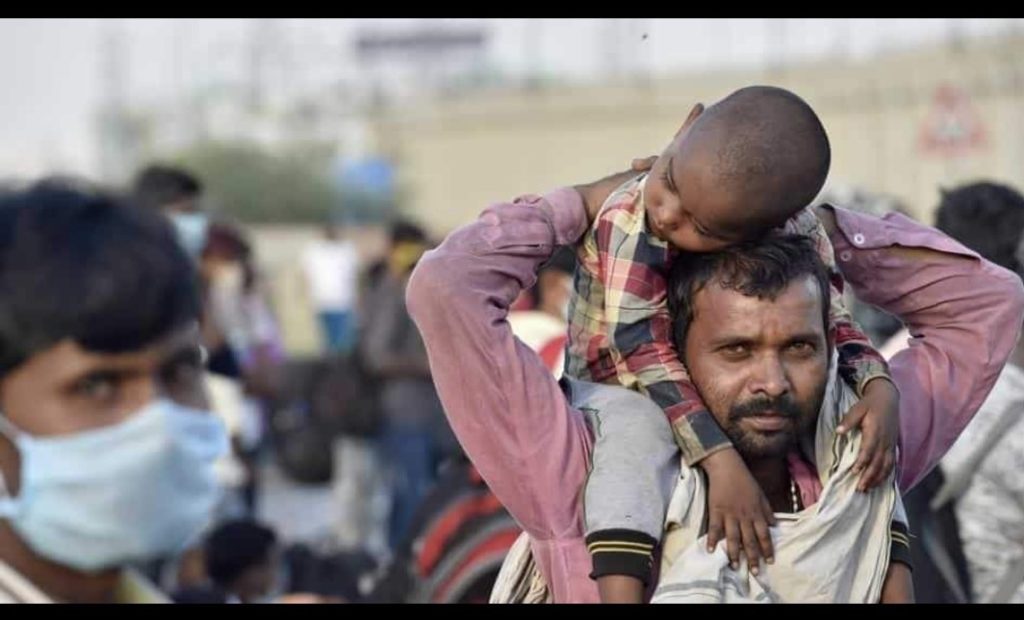
A child dozing on the shoulder of his father, a migrant labourer
India has witnessed an unprecedented and huge reverse migration as millions of migrant labourers lost their jobs and were left stranded without income, food or shelter, as a fallout of the strict nationwide lockdown to contain the spread of COVID-19. Millions of labourers from lesser developed states of India work in unorganised sectors in the more affluent parts of the country. They are mostly unregistered labourers uncovered by any social security schemes. The news that their loved ones back home in villages have also started to suffer from lack of food and essential commodities, made them restless. In desperation, they yearned to go back to their native village to be with them but, since there was complete shutdown of road and rail transport with strict travel restrictions being enforced, travel was made virtually impossible. However, driven by their intense desire to be with their families, they decided to walk hundreds of miles in order to reach their homes.
Soon, touching and heart rending stories of their struggles on the way back home, started making social media headlines. The sight of dozing and perplexed infants on the shoulder of their parents brought tears to many eyes. Extreme physical exertions, fatigue, thirst, hunger and scorching heat failed to weaken their resolve to reach their destinations. Even when the administration and police tried to dissuade them from their journey at several locations, they carried on taking alternative routes because they longed to be with their loved ones.

Migrant labourer, Ramprakash, in tears
When Ramprakash, a labourer in Nazafgarh, heard about the death of his eight-month old son, he left for his home, nearly 1,176 kilometres away in Begusarai, a district in Bihar. At the Delhi-UP border, he was stopped by the administration. Without food and water for two days, he finally broke down in tears and cried to the authorities to allow him to proceed. Fortunately, his plight moved one officer, who took pity on him and arranged for his travel back home.

Ramu pulling a handcart carrying his pregnant wife and daughter
It took 17 days for Ramu, another migrant labourer working in Hyderabad, to cover a distance of 800 kilometres to reach his home in Balaghat in Odissa, carrying his eight-month pregnant wife, Dhanwanti, and his two year old daughter Anuragini in a woodenhandcart he made out ofwood and bamboo pieces he collected from the roadside. Social media is flooded with numerous such stories of migrants beating all odds to reach their families.
An important lesson that COVID 19 has taught us is that the family is the ‘go to place’ for safety, care and comfort. Unfortunately, in recent times, we have refused to give its rightful place to the institution of family, instead promoting individualism. As we are enjoying the safety and comfort provided by our families in the present pandemic, let us learn to value it. As an organisation, Viva strongly believes that every child needs a loving and caring family. Let us come together to build more and more happy families for the betterment of our younger generation. Let us invest in families to make the world a better place.
Viva’s response is significant, as real collective action brings about holistic change for children on a larger scale than any one organisation could achieve on their own. We are so grateful for your support, as Viva works to change more children’s lives, more effectively.
